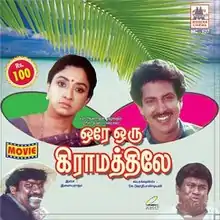Ore Oru Gramathiley
Ore Oru Gramathiley (transl. Once upon a time in a village) is a 1987 Indian Tamil-language film directed by K. Jyothi Pandian. The film stars Lakshmi and Nizhalgal Ravi. Based on the play Gandhi Gramam (transl. Gandhi Village) by Vaali, it revolves around a collector who manipulates her caste certificate to get a government job.
| Ore Oru Gramathiley | |
|---|---|
 VCD cover | |
| Directed by | K. Jyothi Pandian |
| Based on | Gandhi Gramam by Vaali |
| Produced by | S. Rangarajan |
| Starring | Lakshmi Nizhalgal Ravi |
| Cinematography | Rangaa |
| Edited by | T. K. Rajan |
| Music by | Ilaiyaraaja |
Production company | Aries Enterprises |
Release date |
|
| Country | India |
| Language | Tamil |
The film became controversial for criticising caste based reservations, but was later cleared for release by the Supreme Court of India following changes in the climax, and won the National Film Award for Best Film on Other Social Issues.
Plot
Cast
- Lakshmi as Gayathri/Karuppayi
- Nizhalgal Ravi
- Poornam Viswanathan as Shankara Sastri
- Charle
- V. K. Ramasamy
- Vinu Chakravarthy
- Delhi Ganesh
- Senthil
- Kamala Kamesh
- Manorama
Soundtrack
Soundtrack was composed by Ilaiyaraaja.[3][4]
| Song | Singers | Lyrics |
| "Vanthirichu" | Gangai Amaran | Vaali |
| "Rettaikiligal" | K. J. Yesudas, K. S. Chithra | |
| "Padichu Ennatha" | Ilaiyaraaja, S. P. Sailaja | |
| "Ore Oru Gramathiley" | Malaysia Vasudevan | |
| "Ola Kudisaiyile" | S. Janaki | |
| "Jaathi Ennada" | Malaysia Vasudevan | |
| "Nallathor Veenai" | K. S. Chithra | Bharathiyar |
Reception
C. V. Aravind of The Indian Express praised the film for having a "novel theme", but said the comedy track was "not up to the mark".[5]
Controversies
Ore Oru Gramathiley was initially banned for criticising caste based reservations. The Supreme Court of India later allowed its release,[6][7][8] after the producer agreed to make changes in the climax.[9] After it won the National Film Award for Best Film on Other Social Issues, a writ plea to have the award nullified was made in the High Court. The plaintiff argued that the conferment of the award should be deemed "illegal" since the film was screened for the jury even before the ban was lifted by the Supreme Court. Ultimately, his efforts were fruitless.[10]
See also
References
- "முத்திரை படம்; விசித்திர அனுபவம்!" [Identity film, weird experience]. Kalki (in Tamil). 30 May 1993. pp. 62–63. Archived from the original on 5 August 2023. Retrieved 5 August 2023.
- "90 வயதிலும் நடிப்பில் அசத்தும் சவுகார் ஜானகி!". Dinamalar (in Tamil). 16 December 2021. Archived from the original on 6 December 2022. Retrieved 6 December 2022.
- "Ore Oru Gramathile Tamil Film LP Vinyl Record by Ilayaraja". Mossymart. Archived from the original on 30 October 2021. Retrieved 11 March 2022.
- "Ore Oru Gramathiley". JioSaavn. 14 August 1987. Archived from the original on 11 March 2022. Retrieved 11 March 2022.
- Aravind, C. V. (1 April 1988). "Novel theme". The Indian Express. p. 5. Retrieved 11 March 2022.
- Subramanian, Samanth (14 February 2012). "From Tamil Film, a Landmark Case on Free Speech". The New York Times. India. Archived from the original on 30 May 2013. Retrieved 7 May 2013.
- "For the record- The state cannot plead its inability to handle the hostile audience problem: SC". The Indian Express. 21 November 2017. Archived from the original on 23 January 2018. Retrieved 11 March 2022.
- "SC stays High Court order on Tamil film". The Indian Express. 3 May 1988. p. 3. Retrieved 5 August 2022.
- Raman, Mohan V. (1 November 2014). "Our too-easily offended public". The Hindu. Archived from the original on 20 February 2022. Retrieved 18 August 2022.
- "Plea to nullify national award to Tamil film". The Indian Express. 12 August 1988. p. 3. Retrieved 10 June 2022.